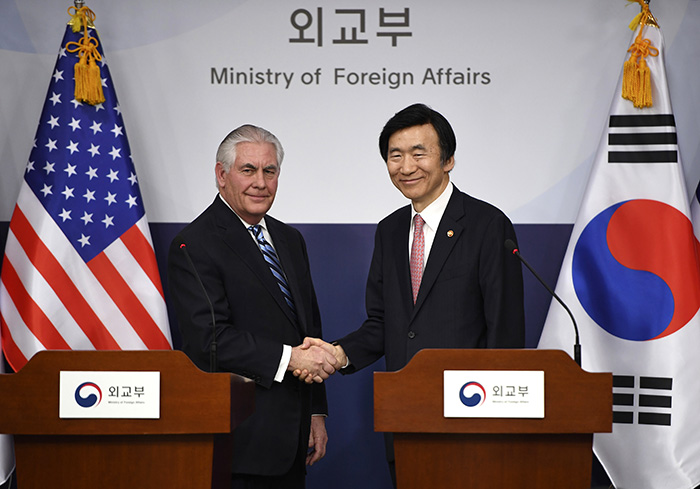-
 Korea.net's 24-hour YouTube channel
Korea.net's 24-hour YouTube channel- NEWS FOCUS
- ABOUT KOREA
- EVENTS
- RESOURCES
- GOVERNMENT
- ABOUT US
View this article in another language
- 한국어
- English
- 日本語
- 中文
- العربية
- Español
- Français
- Deutsch
- Pусский
- Tiếng Việt
- Indonesian

U.S. Secretary of State Rex Tillerson on Friday provided a glimpse into the Donald Trump administration's new approach to North Korea, which would be a sharp turn from his predecessor's "strategic patience."
In a news conference in Seoul, the top diplomat strongly indicated there will be no talks until its complete denuclearization and that military action will be an option in dealing with its elevated threat.
"Let me be clear, the policy of strategic patience has ended." the first state secretary of President Trump said ahead of his talks with South Korean Foreign Minister Yun Byung-se.
He was referring to the Barack Obama administration's signature Pyongyang policy which it took after the collapse of the so-called "leap day" agreement signed by the two sides on Feb. 29, 2012.
Under the landmark deal, North Korea was promised food aid in return for a moratorium on its nuclear and missile development. It fell through less than two months, however, as the country went ahead with a prohibited launch of what it claimed to be a satellite using long-range ballistic missile technology.
"Efforts toward North Korea to achieve peaceful stability over the last two decades have failed to make us safer .... America has provided US$1.3 billion in assistance for North Korea since 1995," Tillerson said.
He was speaking about similar botched quid pro quo agreements with North Korea in the past.
Amid heightened tensions following North Korea's withdrawal from the Nuclear Non-Proliferation Treaty in 1993, the two sides clinched the Agreed Framework in Geneva the following year.
The deal, aimed at freezing North Korea's fledgling nuclear weapons program in return for energy assistance, fell apart a few years later as the North defiantly continued its nuclear ambitions.
A broader framework to disarm the North ensued in 2003 in the form of the six-party talks involving the two Koreas, the U.S., Japan, China and Russia. The multilateral efforts also collapsed five years later, with North Korea found to be sticking to its banned program behind the backs of the negotiations.
North Korea has significantly advanced its nuclear weapons capability carrying out five nuclear tests since 2006, including two explosions last year.
Experts assess that the North is only a couple of years away from arming itself with a nuclear-tipped intercontinental ballistic missile that could reach as far as the U.S. mainland.
Tillerson's message made it clear that the U.S. will no longer engage or reward North Korea for fake denuclearization commitments, and that it will go so far as to use military action if necessary.
"All options are on the table. (Although) certainly we do not want things to get to a military conflict, we are quite clear on that," he said. "If North Korea takes actions that threaten South Korean forces or our own forces, that will be met with an appropriate response."
The former Exxon Mobil chief also stressed the U.S. will continue to develop a comprehensive set of capabilities to counter the growing North Korean ballistic missile threat.
He called on the leadership of North Korea to realize that nuclear renouncement is the only path to its security and economic development.
"That path could only be achieved by denuclearizing and giving up their weapons of mass destruction. Only then will we be prepared to engage them in talks."
He also indicated the U.S. would raise the bar before any talks can begin when he said that the U.S. wouldn't be satisfied with just a freeze of the North's nuclear program, but it would want complete dismantlement.
"(A freeze deal) will leave North Korea significant capabilities that will represent a true threat not just to the region but to American forces of the world."
The envisioned turn of the U.S. North Korea policy direction comes amid ever-greater security challenges posed by North Korea's advancing nuclear and missile programs.
"Tillerson and Minister Yun 100 percent agreed on the point that now is not the time to discuss talks with North Korea, but sanctions and pressures should be further increased to reconfigure North Korea's calculus," a South Korean diplomat said on the condition of anonymity.
"Any talks with North Korea, they agreed, should be only for the purpose of the complete, verifiable, irreversible denuclearization of the country," he said after their talks.
By Yonhap News













